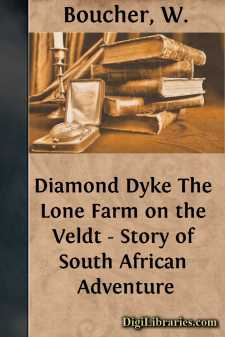Categories
- Antiques & Collectibles 13
- Architecture 36
- Art 48
- Bibles 22
- Biography & Autobiography 813
- Body, Mind & Spirit 142
- Business & Economics 28
- Children's Books 15
- Children's Fiction 12
- Computers 4
- Cooking 94
- Crafts & Hobbies 4
- Drama 346
- Education 46
- Family & Relationships 57
- Fiction 11828
- Games 19
- Gardening 17
- Health & Fitness 34
- History 1377
- House & Home 1
- Humor 147
- Juvenile Fiction 1873
- Juvenile Nonfiction 202
- Language Arts & Disciplines 88
- Law 16
- Literary Collections 686
- Literary Criticism 179
- Mathematics 13
- Medical 41
- Music 40
- Nature 179
- Non-Classifiable 1768
- Performing Arts 7
- Periodicals 1453
- Philosophy 64
- Photography 2
- Poetry 896
- Political Science 203
- Psychology 42
- Reference 154
- Religion 513
- Science 126
- Self-Help 84
- Social Science 81
- Sports & Recreation 34
- Study Aids 3
- Technology & Engineering 59
- Transportation 23
- Travel 463
- True Crime 29
Diamond Dyke The Lone Farm on the Veldt - Story of South African Adventure
by: W. Boucher
Categories:
Description:
Excerpt
Query Bad Shillings?
“Hi!”
No answer.
“Hi! Dyke!”
The lad addressed did not turn his head, but walked straight on, with the dwarf karroo bushes crackling and snapping under his feet, while at each call he gave an angry kick out, sending the dry red sand flying.
He was making for the kopje or head of bald granite which rose high out of the level plain—where, save in patches, there was hardly a tree to be seen—for amongst these piled-up masses of glittering stone, lay deep moist crevices in which were shade and trickling water, the great blessings of a dry and thirsty desert.
“Hi! Do you hear, Dyke?” came again, shouted by a big athletic-looking young man, in flannels and a broad-brimmed Panama hat, and he gave his thick brown beard an angry tug as he spoke.
“Oh yes, I hear,” muttered the lad; “I can hear you, old Joe. He’s got away again, and I shan’t come. A stupid-headed, vicious, long-legged beast, that’s what he is.”
“Hi!” roared the young man, as he stood in front of an ugly corrugated iron shed, dignified by the name of house, from which the white-wash, laid thickly over the grey zinc galvanising to ward off the rays of the blinding Afric sun, had peeled away here and there in patches.
Some attempts had been made to take off the square, desolate ugliness of the building by planting a patch of garden surrounded by posts and wire; but they were not very successful, for, as a rule, things would not grow for want of water.
Vandyke Emson—the Dyke shouted at—had been the gardener, and so long as he toiled hard, fetching water from the granite kopje springs, a quarter of a mile away, and tended the roots he put in the virgin soil, they rushed up out of the ground; but, as he reasonably said, he couldn’t do everything, and if he omitted to play Aquarius for twenty-four hours, there were the plants that looked so flourishing yesterday shrivelled to nothing. He had planted creepers to run all over the sides and roof, but the sun made the corrugated iron red hot—the boy’s exaggerated figure of speech, but so hot that you could not keep your hand upon the roof or wall—and the creepers found the temperature too much for their constitution, and they rapidly turned to hay. Then he trained up tomatoes, which grew at express speed so long as they were watered, formed splendid fruit, were left to themselves a couple of days, and then followed suit with the creepers. Joseph Emson smiled behind his great beard, and said they were a success because the tomatoes were cooked ready for use; but Dyke said it was another failure, because they were just as good raw, and he did not like to eat his fruit as vegetables cooked in a frying-pan covered with white-wash.
Still all was not bare, for a patch of great sunflowers found moisture enough for their roots somewhere far below, and sent up their great pithy stalks close to the house door, spread their rough leaves, and imitated the sun’s disk in their broad, round, yellow flowers. There was an ugly euphorbia too, with its thorny, almost leafless branches and brilliant scarlet flowers; while grotesque and hideous-looking, with its great, flat, oblong, biscuit-shaped patches of juicy leaf, studded with great thorns, a prickly pear or opuntia reared itself against the end gable, warranted to stop every one who approached....



